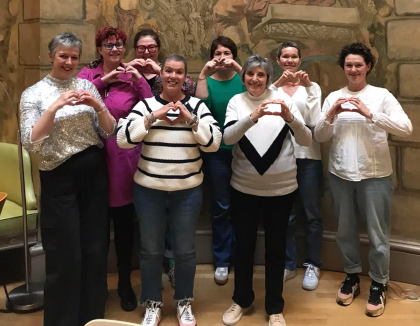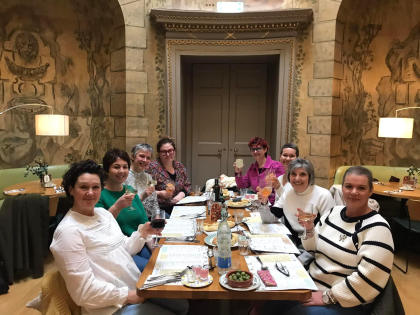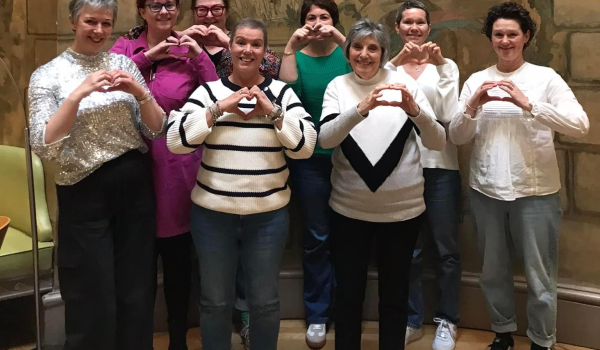Sarah had felt a lump in her stomach for a few months but didn’t think it would be anything serious.
“With no other symptoms I put it down to a whole host of things, but eventually booked an appointment with my GP.”
Nothing was identified on an ultrasound scan but a CA125 blood test - used as an indicator of ovarian cancer - came back at 1,737. A normal level is usually less than 35.
I met with my consultant who explained that I would need a full hysterectomy and if they found it was cancer during the procedure then I would also need chemotherapy.
It was after this first surgery that Sarah received her diagnosis. Stage 3c ovarian cancer.
Months later, after six sessions of chemotherapy and another surgery, it was confirmed that Sarah had no evidence of disease (NED). In that moment, the treatment had worked. But that was when Sarah began looking for support on how best to return to her life after cancer. How to live with the constant anxiety that the cancer could come back at any time. And what would come next.
Gillian started to notice a bit of a bulge in her tummy but put it down to the menopause and tried to tone up. However, by January 2023 she was experiencing chronic pain when going to the toilet and had noticed blood in her urine. Gillian booked a GP appointment and was prescribed antibiotics for a bladder infection, but just two days later was in A&E.
“I was told that it was potentially a cyst and was kept in for further tests. By the end of that week, I was sent for an MRI scan to confirm a possible abscess.”
Those MRI results showed that Gillian had cancer. Stage 3 high grade serous ovarian cancer with a tumour measuring 21cm in length.
Weeks later Gillian had undergone major debulking surgery, successfully removing the entire tumour, but leaving her with a stoma and nerve damage in her bladder. After recovery it was straight onto chemotherapy, with six sessions in total.
Nothing can really prepare you for what treatment does to your body. When I stand in front of the mirror, I no longer recognise myself, the horrific scar, the stoma, my post chemo hairdo etc.
Life after treatment
Target Ovarian Cancer recognises that coming to the end of treatment does not mean that everything just goes back to the way it was before. It's often the time when the most emotional support is required. However, it's clear that there is a real lack of any support for women at this time.
My Next Steps is a unique online course, delivered via zoom by us, designed to accommodate the needs of women after finishing first line treatment. It's the only ovarian cancer specific course in the UK.
Embodying the theme for this year’s International Women's Day, Inspire Inclusion, the course was created by our nurse advisers in collaboration with women who are living with ovarian cancer. Who better to advise than those who have experienced, first hand, the uncertainty of life once treatment ends?
By including these women in its conception there was an immediate sense of belonging – with women joining subsequent courses secure in the knowledge that it was shaped by people just like them. As a result, the course covers subjects that these women feel are the most important to support their recovery.
A support network

‘Some cancers are more treatable than others and an ovarian cancer diagnosis is a scary one, so just to be able to speak to other women who were going through a similar thing sounded like a wonderful solution,” explained Sarah. “Talking through the same hopes and fears, the same questions, it quickly became a forum where we could ask anything. From the best shampoo to help hair regrowth to booking travel insurance after treatment.”
Gillian added:
It just sounded like the perfect thing for me. After chemotherapy, your appointments become less regular, and it can feel like you’re back out there on your own. To have the opportunity to connect with other women that have been through the same thing was an exciting prospect. Ovarian cancer affects so much of your body, it’s different to other cancers, and I didn’t know anyone else that had been through it. Until I joined the My Next Steps group.
My Next Steps uses expert speakers to deliver sessions aimed at addressing unmet needs of the women who are participating. These include building emotional resilience, understanding their treatment and follow up, and sex and intimacy after a diagnosis.
This empowering seven-week programme encourages and equips members to take their next steps towards feeling in control of their physical, emotional, and mental wellbeing.
“This course truly gave me all the support and information that I had been looking for,” exclaimed Gillian. “The content was exactly what I needed after finishing treatment, especially the expert advice about sex, intimacy and getting back to exercise. All the topics were empowering, giving us the chance to take back control of what happens next.”
Sarah said that:
Immediately after the diagnosis I felt overwhelmed with new emotions and different questions. It was very reassuring to share my story and be supported by a group of women who were also going through a similar experience. It felt inspiring to be a part of something bigger than just me – something that will hopefully continue to grow and empower other women living with an ovarian cancer diagnosis.
And it is this feeling that highlights the importance of the 2024 theme for International Women’s Day – Inspire Inclusion. When women come together and feel part of the conversation, they can make informed decisions about their health and create positive change for future generations.
To speak to a specialist nurse, call the dedicated support line on 0207 923 5475.
Find out more about the My Next Steps course

- Written by Rachel Mugnai, Lead Nurse Adviser at Target Ovarian Cancer
Rachel Mugnai is Lead nurse adviser at Target Ovarian Cancer. Rachel provides information and support to anyone affected by ovarian cancer through the charity’s nurse-led support line. She also supports the development of award-winning patient information and engages with Clinical Nurse Specialists to advance the care received by women with ovarian cancer across the UK.
In previous roles Rachel has worked as both a Clinical Nurse Specialist and Clinical Trials Nurse in gynae oncology. She has experience in providing holistic, evidence-based care to women with ovarian cancer and their families and providing nurse-led follow up services.



